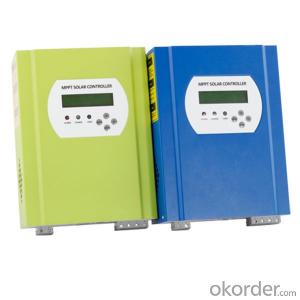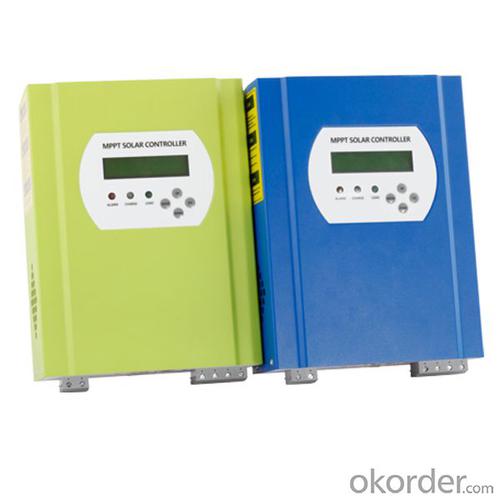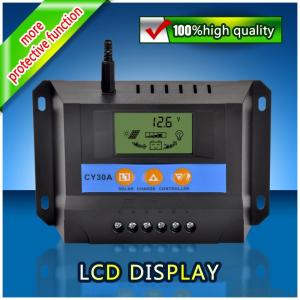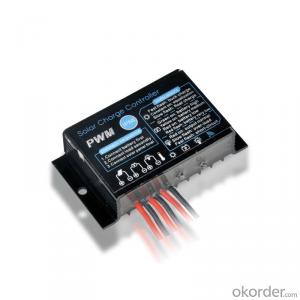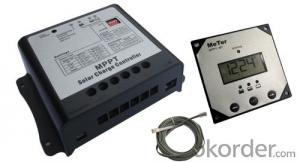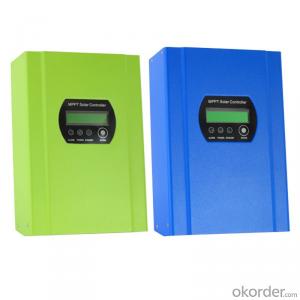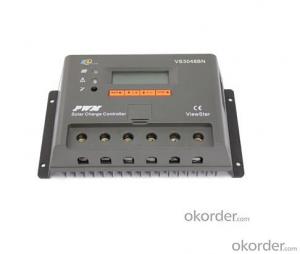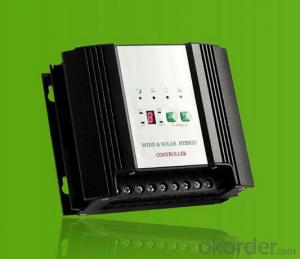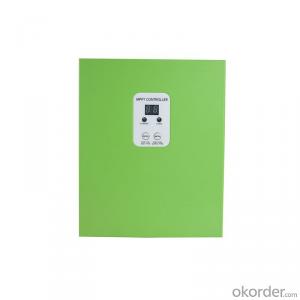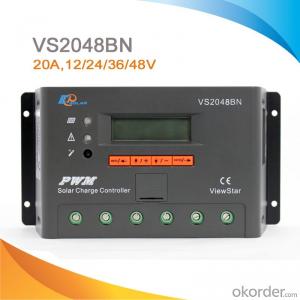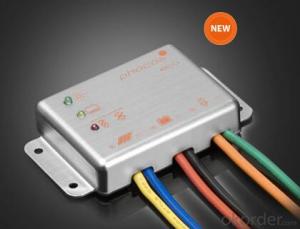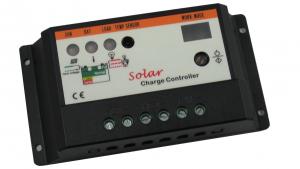Marine Solar Charge Controllers Smart2 30A Solar MPPT Battery Charger Controller DC 12V/24V/48V
- Loading Port:
- China main port
- Payment Terms:
- TT OR LC
- Min Order Qty:
- 20 unit
- Supply Capability:
- 9999 unit/month
OKorder Service Pledge
OKorder Financial Service
You Might Also Like
Smart2 30A Solar MPPT Battery Charger Controller
More Pictures
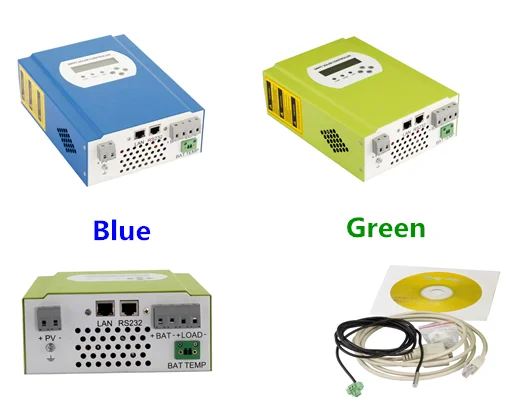
LAN/RS232 connecting
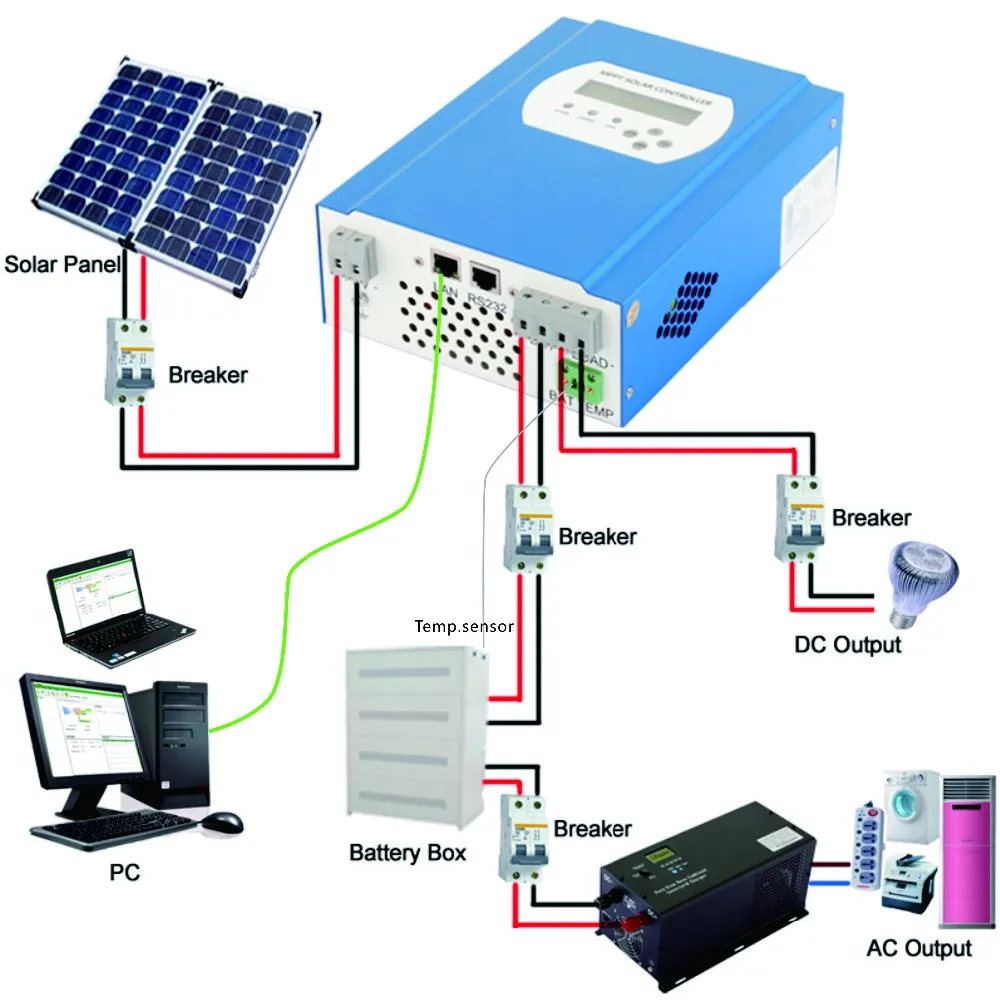
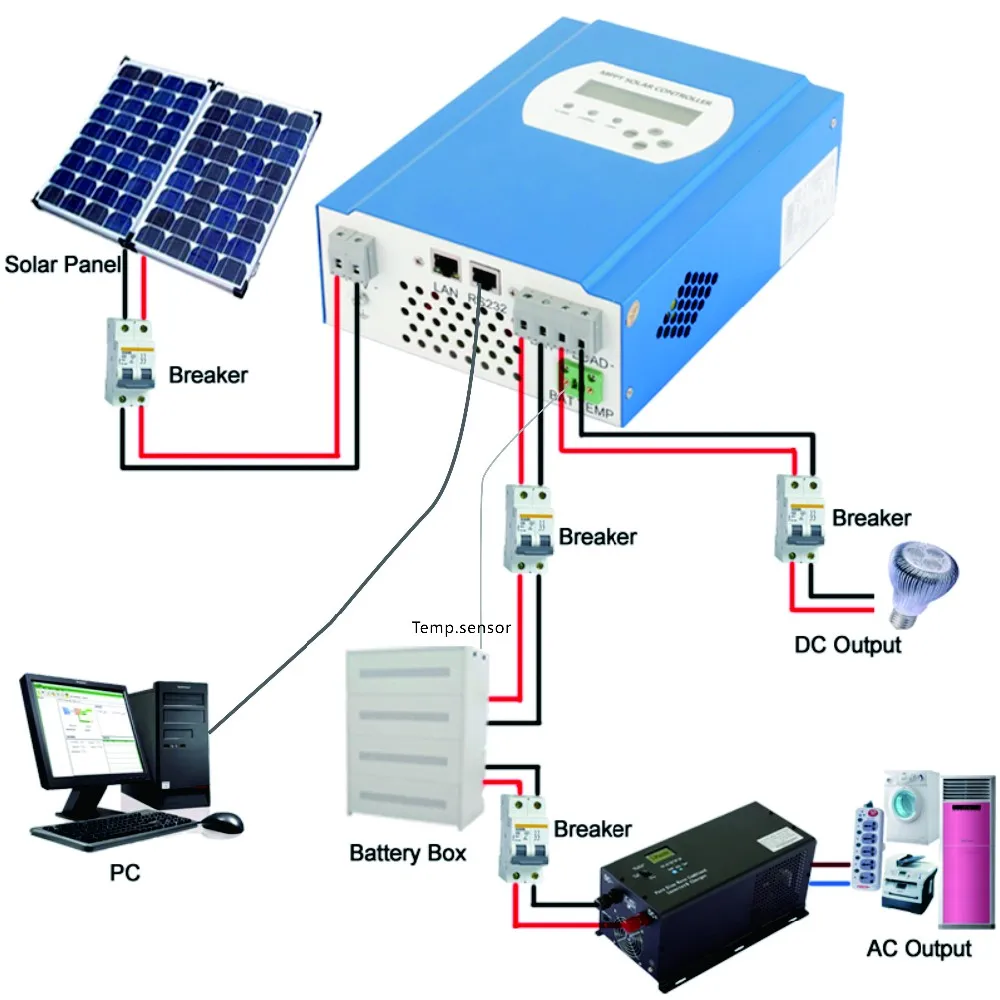
Upper PC software (real time monitor)
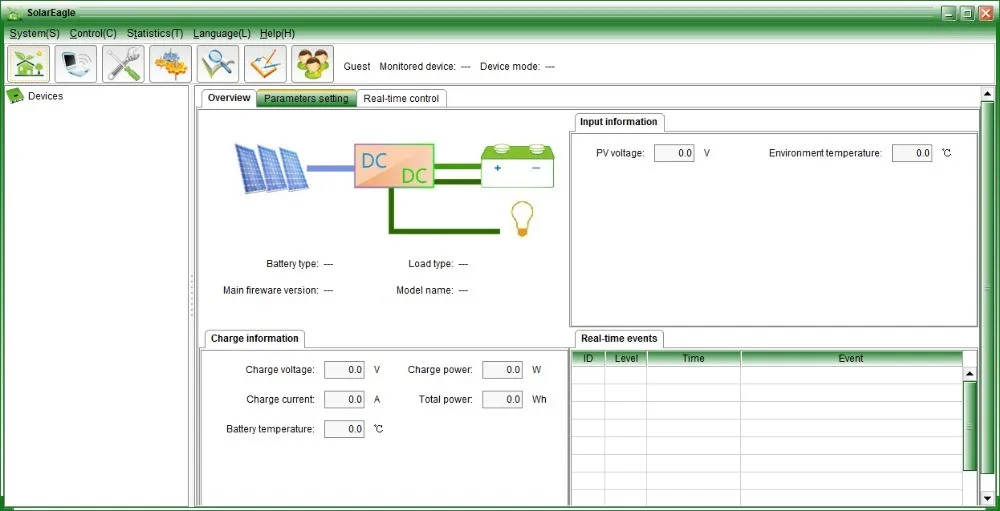
Application
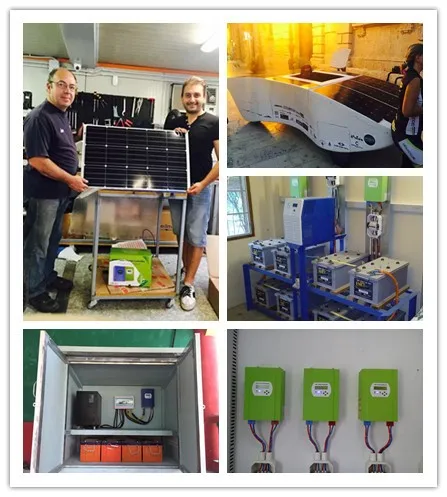
Feature
1. MPPT charging mode, conversion efficiency upto 99%
2. Maximum PV input voltage up to DC150V
3. RS232 and LAN communication port
4.Discharge mode: ON/OFF mode, double time control mode, PV voltage control mode, PV voltage+time delay mode.
5.LCD and LED show various parameters
6. Controllers can be connected in unlimited parallels
7. CE,RoHS, FCC certification approved
8. 2 years warranty, lifelong free technical service.
Parameter
| Model:I-P-SMART2-20A/25A/30A -series | 20A | 25A | 30A | ||
| Charge Mode | Maximum Power Point Tracking | ||||
| Method | 3 stages: fast charge(MPPT),constant voltage, floating charge | ||||
| System Type | DC12V/24V/48V | Automatic recognition | |||
| PV Modules Utilization Rate | 12V/24V/48Vsystem | ≥99% | |||
| Input Characteristics | |||||
| MPPT Working Voltage and Range | 12V system | DC18V~DC150V | |||
| 24V system | DC34~DC150V | ||||
| 48V system | DC65~DC150V | ||||
| Input Overvoltage Protection Point | 12V/24V/48V system | DC150V | |||
| Max. PV Power | 12V system | 286W | 357W | 429W | |
| 24V system | 572W | 715W | 858W | ||
| 48V system | 1144W | 1430W | 1716W | ||
| Output Characteristics | |||||
| Selectable Battery Types | 12V/24V/48Vsystem | Sealed lead acid, vented, Gel, NiCd battery | |||
| (Default type is GEL battery) | (Other types of the batteries also can be defined) | ||||
| Rated Output Current | 12V/24V/48V system | 20A | 25A | 30A | |
| Physical | |||||
| Pc (communication port) | RS232 or LAN | ||||
| Measurement D*W*H(mm) | 220*165*70mm | ||||
| N.G(kg) | 2kg | ||||
| Color | Blue/Green/OEM (optional) | ||||
| Safety | CE, RoHS,FCC | ||||
Certifications |
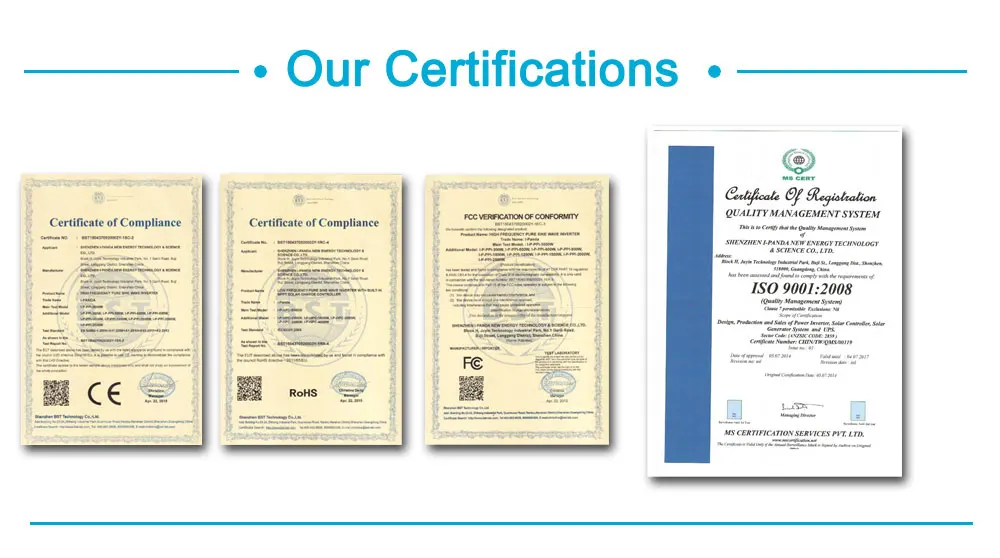
F&Q: |
Q1. How to ensure and monitor the products quality?
A1: We have established a perfect Quality Management System, In strict
accordance with ISO9001: 2008 quality system and ISO14001 environment system for quality assurance management;
Our ISO9001:2008 Quality System certificate encoding: CHIN/TW/QMS/00119;
Our ISO14001 Environment System certificate encoding: CHIN/TW/EMS/00028;
Q2. What is the warranty of products?
A2: The warranty period of different products are different; 5 years, 3 years, 2 years, 1 years; More details please refer to the product specification or manual; we will provide free life-long technical support ;
Q3. What is the difference between MPPT&PWM?
A3. MPPT charging mode, peak efficiency up to 99%, saving 30%~60% solar panel than traditional PWM controller.
- Q: Can a solar controller be used with multiple solar panels?
- Yes, a solar controller can be used with multiple solar panels. The solar controller regulates the amount of charge going into the batteries, and it can handle the combined output of multiple solar panels efficiently.
- Q: Can a solar controller be used with a 120V AC system?
- A 120V AC system cannot be used with a solar controller. The purpose of a solar controller is to regulate and control the electricity flow from solar panels to a battery bank or DC loads. Its operation is based on a DC voltage range, typically between 12V and 48V. Conversely, a 120V AC system operates on alternating current and necessitates a different type of controller, like a charge controller or an inverter, to convert the DC power from solar panels into AC power suitable for use in the system. These controllers are specifically designed to handle the higher voltage and frequency of AC power. Hence, attempting to utilize a solar controller with a 120V AC system would not be compatible and may potentially cause damage to the controller or other components in the system. It is crucial to utilize the appropriate controller that matches the specific voltage and current requirements of the system to ensure safe and efficient operation.
- Q: Can a solar controller be used with a solar-powered composting system?
- Yes, a solar controller can be used with a solar-powered composting system. A solar controller is designed to regulate and optimize the charging and discharging of batteries in a solar power system. In a solar-powered composting system, the solar controller can be used to monitor and control the energy flow from the solar panels to the composting system's components such as fans, heaters, or sensors. This ensures efficient use of solar energy and helps maintain optimal conditions for composting.
- Q: What is the maximum wire size that can be connected to a solar controller?
- The specific model and specifications of the solar controller determine the maximum wire size that can be connected. Typically, solar controllers can handle wire sizes ranging from 10 AWG to 2 AWG. However, it is essential to refer to the manufacturer's instructions or technical documentation for the specific solar controller in use to determine its maximum wire size capacity. Adhering to the manufacturer's guidelines guarantees that the system operates within its intended parameters, ensuring optimal performance and safety.
- Q: How does a solar controller handle battery balancing?
- A solar controller handles battery balancing by monitoring the charge level of individual batteries in a battery bank and ensuring that each battery receives an equal amount of charge. It achieves this by regulating the charging current and voltage to prevent overcharging or undercharging of any individual battery. This helps to prolong the battery life and optimize the overall performance of the battery bank.
- Q: Can a solar controller be used in both off-grid and grid-tied systems?
- No, a solar controller cannot be used in both off-grid and grid-tied systems. Off-grid systems require a solar controller to manage the battery charging and discharging process, while grid-tied systems do not use batteries and therefore do not require a solar controller.
- Q: Can a solar controller be used with a portable solar generator?
- Yes, a solar controller can be used with a portable solar generator. The solar controller helps regulate the flow of electricity from the solar panels to the generator's battery, ensuring efficient charging and preventing overcharging. This is especially useful for portable solar generators as it helps optimize their performance and protect the battery.
- Q: Can a solar controller be used with a wind turbine system?
- Yes, a solar controller can be used with a wind turbine system. A solar controller is designed to regulate the charging and discharging of batteries in a solar power system. Similarly, a wind turbine system also generates electricity that needs to be regulated and stored in batteries. Therefore, a solar controller can effectively manage the charging and discharging process in a wind turbine system as well.
- Q: Can a solar controller handle both 12V and 24V systems?
- No, a solar controller cannot handle both 12V and 24V systems. It is designed to work with either a 12V or a 24V system, but not both simultaneously.
- Q: What is the output voltage range of a solar controller?
- The output voltage range of a solar controller typically varies and depends on the specific model and manufacturer. However, in general, most solar controllers have an output voltage range of 12-48 volts, which is compatible with common battery systems used in solar power applications.
Send your message to us
Marine Solar Charge Controllers Smart2 30A Solar MPPT Battery Charger Controller DC 12V/24V/48V
- Loading Port:
- China main port
- Payment Terms:
- TT OR LC
- Min Order Qty:
- 20 unit
- Supply Capability:
- 9999 unit/month
OKorder Service Pledge
OKorder Financial Service
Similar products
Hot products
Hot Searches
Related keywords
